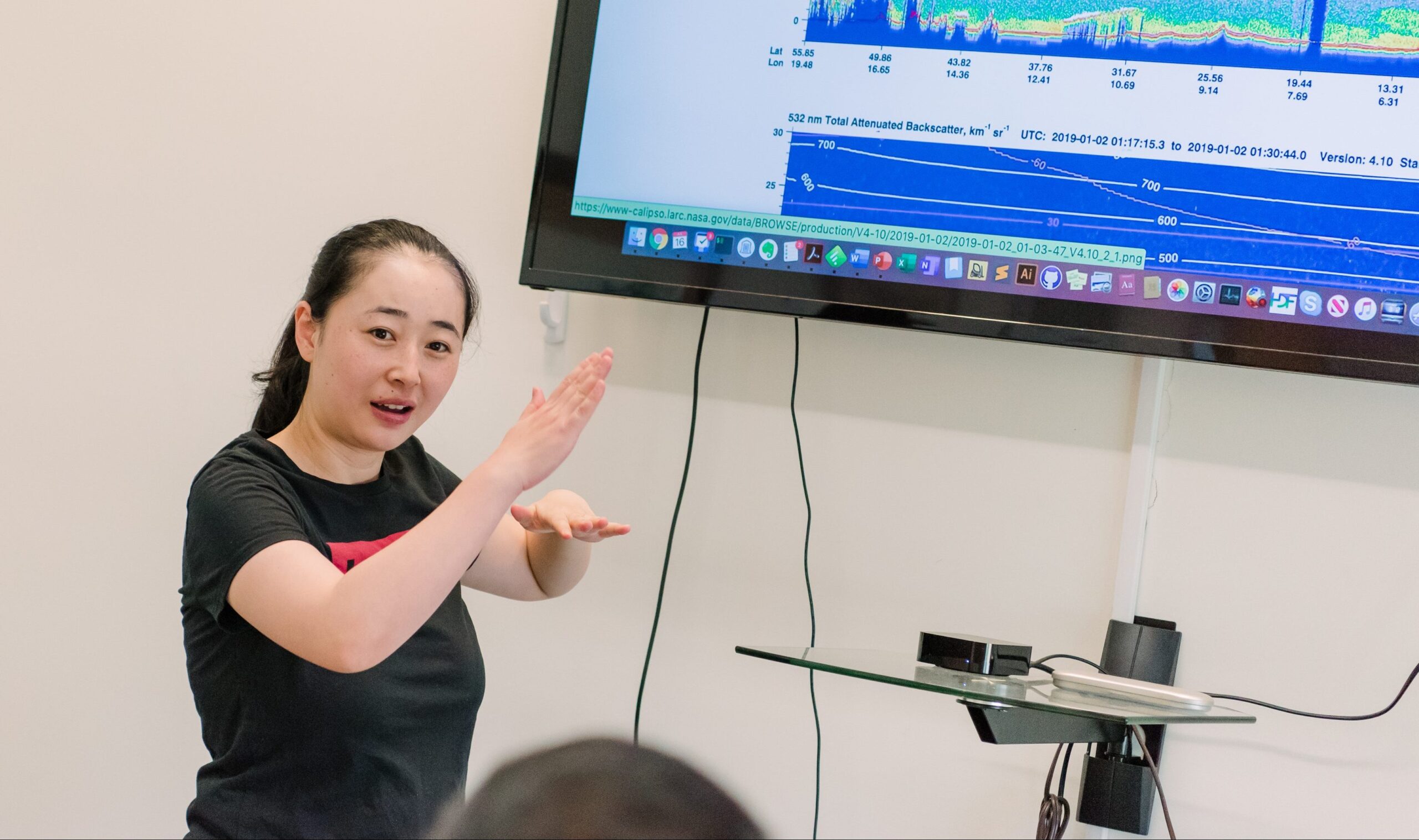UMBC’s Qianqian Song has just received the Future Investigators in NASA Earth and Space Science and Technology (FINESST) Fellowship—one of just 59 such fellowships granted nationwide this year. The award provides $45,000 per year for three years for her to continue her studies at UMBC with Zhibo Zhang, associate professor of physics.
Song, a fourth-year Ph.D. candidate in atmospheric physics, is studying how dust above clouds affects the global climate. Large amounts of dust enter the atmosphere when strong winds blow across dry areas, such as the Sahara Desert. Previous research from the Zhang lab showed that this dust travels thousands of miles and provides critical nutrients to the Amazon rainforest. Other studies have suggested that the dust has an overall cooling effect on climate, by blocking short-wave radiation coming from the sun. “But they were neglecting the long-wave effect,” says Song. This is where her innovative work comes in.
As long-wave radiation rises into the atmosphere from Earth’s surface, dust can block it from exiting the atmosphere, producing a warming effect. “In our research we found that the dust’s long-wave warming effect cancels about 30 percent of the short-wave cooling effect,” Song explains. Incorporating this new understanding into climate models could have a significant impact on the models’ predictions.
Now Song wants to learn more about how the dust interacts with nearby clouds: How does it affect the size of water droplets in the clouds, or how densely the droplets are packed together? Massive amounts of data obtained by NASA satellites and aircraft and powerful computational tools will assist Song as she works on answering these challenging questions.
Embracing change at UMBC
Qianqian has come a long way since her 2014 arrival in the U.S. from China with her husband, who had obtained a student visa to pursue a Ph.D. in electrical engineering at Johns Hopkins University. Coming to the U.S. “was a big change,” she says. For one, “When we came, our English wasn’t good. It was hard. But now it’s much better.”
After a year, Song decided to pursue her own Ph.D. “When I visited UMBC, I felt like everyone knows each other and supports each other in the physics department,” she remembers. “That’s why I chose here.”

However, the visa process proved challenging, and she thought she would have to postpone her enrollment another year. But physics graduate program director Todd Pittman stepped in. “He talked to the whole department,” Song says, and got department chair Michael Hayden’s support for a special, temporary scholarship for Song to initially join the UMBC community as a part-time student. She dived into her courses and research rotations, and the next semester Song was able to finalize her visa and begin her full-time studies.
A rotation in Zhang’s lab sparked Song’s interest in atmospheric research. “Before I came here, I did my master’s degree in Beijing. The pollution there is very severe,” Song shares. “So since living there, I am interested in atmospheric science. When I did a rotation with Dr. Zhang, I did research on dust aerosols, and I got very interested in learning about their role in climate change.”
Pursuing her dream
Now, Song is excelling. “I think she is rising to become a future leader in our field,” says Zhang.
Song shares that UMBC’s supportive network has had a major impact on her experience. “Dr. Zhang is an excellent adviser. He teaches us communication skills and helps us a lot in our research,” she says. “In this research group everyone helps each other, not only on our research but also in our personal life.”
That’s been important for Song, who recently welcomed her first child. The flexibility to work and participate in meetings from home, when needed, allowed her to continue her research at full speed while she was pregnant and now, as she raises her baby with her husband. “I was in my third trimester when I was writing the fellowship proposal,” she shares.
Song plans to pursue a career in academia after her Ph.D. “That’s my dream,” she says. With the support of the fellowship, her lab group, and her family, Song will pursue it with confidence.
Banner image: Qianqian Song discusses her research findings with her lab team. Photo by Marlayna Demond ’11 for UMBC.
Tags: CNMS, GradResearch, GraduateSchool, Physics, Research

